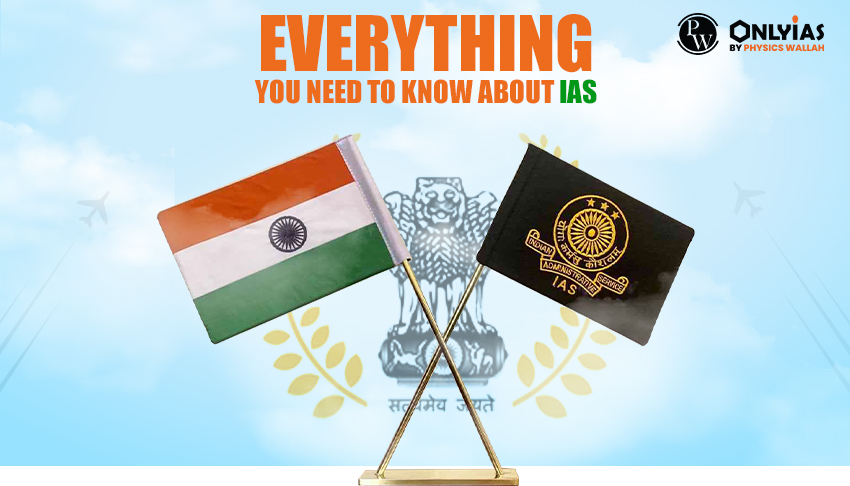

Are you someone who aspires to serve the nation and bring about positive change? Do you dream of a career that is challenging, dynamic and rewarding? If yes, then you might have heard of the Indian Administrative Service.
The full Form of IAS is Indian Administrative Service. It is one of India’s most coveted and prestigious civil services, attracting thousands of aspirants every year. But before you take the plunge and start preparing for the IAS exam, it’s important to have a comprehensive understanding of what the IAS is all about.
Moreover, the IAS is considered one of the most esteemed and powerful positions in the Indian bureaucracy. It is a part of the All India Services along with the Indian Police Service and the Indian Forest Service.
Furthermore, the IAS officers are responsible for the administration of the country at the district, state, and national levels. They have many duties, such as maintaining law and order, implementing government policies, and managing public resources.
If you have the zeal, determination, and the right mindset, then the IAS can be a life-changing career option for you. It requires hard work, dedication, and a deep sense of commitment towards public service. With this blog, we hope to provide you with the necessary information and insights about the IAS Exam to help you achieve your dream career.
Here, we will discuss some key facts about IAS officers.
The Indian Administrative Service (IAS) has a rich history that dates back to the British colonial era. The IAS was initially formed as the Imperial Civil Service (ICS) in 1858 to oversee the administration of British India. After India’s independence in 1947, the ICS changed to IAS, and the first batch of Indian civil servants was recruited in 1949.
Since then, the IAS has undergone several changes and transformations, making it a highly respected and sought-after career option in India.
Moreover, the IAS has played a significant role in shaping India’s destiny over the years. IAS officers have been instrumental in implementing various developmental policies and programs in different parts of the country. They have been pivotal in building India’s infrastructure, including roads, railways, and communication networks.
Furthermore, the IAS officers have also actively eradicated poverty, promoted education, and improved healthcare facilities. Their contribution to the nation-building process has been commendable, and they continue to work tirelessly to uplift the lives of millions of people in India.
Overall, the history of IAS is a fascinating journey that has shaped the course of Indian history. The contributions of IAS officers in nation-building are immense, and they continue to be a vital force in the development of the country. You can also check for IAS Exam.
The Indian Administrative Service (IAS) is responsible for managing the administration of the Indian government at the central, state, and district levels. The roles of IAS officers are extensive, and they have to undertake various tasks to ensure the smooth functioning of the government machinery.
One of the primary responsibilities of IAS officers is to implement government policies and programs effectively. They are responsible for ensuring that the policies are taken care of at the grassroots level and that the benefits of the programs reach the intended beneficiaries. IAS officers are also responsible for the allocation of funds to various departments and ensuring their proper utilisation.
Moreover, another crucial responsibility of IAS officers is maintaining law and order in their respective districts. They are responsible for overseeing the functioning of the police department, ensuring that the law and order situation is under control, and taking appropriate action in case of any disturbances.
Additionally, the IAS officers are also responsible for managing the state’s finances and ensuring that budgetary allocations should be used optimally. They work closely with the finance department to formulate budgets and manage government finances efficiently.
Furthermore, IAS officers are responsible for overseeing the implementation of various government schemes related to education, healthcare, and rural development.
Overall, the roles and responsibilities of IAS officers are vast and critical in the Indian administrative setup. They play a crucial role in managing the affairs of the government, ensuring that policies are implemented effectively, maintaining law and order, managing finances, and implementing various developmental schemes.
The Indian Administrative Service (IAS) is known for its rigorous training process that prepares officers to handle various responsibilities in the government. The training process includes a mix of classroom learning and on-the-job training, covering various subjects such as law, economics, management, and social sciences.
The training program provides IAS officers with a broad understanding of the administrative setup and the challenges they will likely face in their careers.
Moreover, after completing their training, IAS officers are posted in different districts and states across India. Their primary responsibility is to manage the administration of the area, including maintaining law and order, managing finances, and implementing various government schemes.
Furthermore, the IAS officers are also responsible for liaising with the public and addressing their grievances. They have to be responsive to the needs of the people and work towards improving their lives. Additionally, IAS officers formulate and implement policies at the state and central levels.
IAS officers have ample opportunities for career growth and development. They will go to higher positions, such as district collector, divisional commissioner, and secretary to the government of India, based on their performance and experience.
Overall, the training and posting of IAS officers are critical in preparing them to handle the complex responsibilities of the Indian administrative setup. With ample opportunities for career growth and development, IAS officers can significantly impact the lives of millions of people in India. Also, check for IAS Exam.
The Indian Administrative Service (IAS) is among India’s most prestigious and well-paying jobs. The pay scale of IAS officers is based on the recommendations of the 7th Pay Commission and is revised periodically. As of 2023, the basic IAS salary of an entry-level officer is INR 56,100, with various other allowances and perks.
Moreover, the IAS officers are entitled to various perks and allowances in addition to their salary. They receive a dearness allowance, travel allowance, medical reimbursement, and house rent allowance. Additionally, IAS officers are entitled to a government vehicle, driver, and official residence, depending on their rank and posting.
Furthermore, the IAS officers enjoy job security and other benefits that are not available to other government employees. They get government-sponsored pension plans and access to various medical facilities. Moreover, IAS officers are also entitled to a certain number of leaves, including casual, earned, and medical leave.
Additionally, the IAS officers are entitled to several training and development opportunities to enhance their skills and knowledge. They can attend various workshops, seminars, and conferences to keep themselves updated on the latest developments in their field.
Overall, the IAS salary and benefits are some of the best in the Indian job market, making it a highly coveted position. With job security, various allowances, and perks, IAS officers enjoy a comfortable lifestyle. Additionally, the training and development opportunities offered to IAS officers provide them with ample opportunities. You can also check for the IAS Officer’s salary.
Being an IAS officer comes with a set of unique challenges that can make the job both rewarding and demanding. Here are some of the most significant challenges faced by IAS officers:
Despite these challenges, many IAS officers remain committed to their work and strive to positively impact society. With their dedication, hard work, and willingness to face challenges head-on, IAS officers play a crucial role in shaping the nation’s administration and governance.
The IAS is a prestigious and highly coveted career choice for many young Indians. The IAS plays a crucial role in the administration and governance of the country, and the job comes with unique challenges and rewards. From its origins to its challenges, we have covered everything you need to know about IAS in this article.
Moreover, the IAS offers a challenging and rewarding career that requires hard work, dedication, and a commitment to public service. It is a profession that demands the highest levels of integrity, impartiality, and professionalism.
Overall, the IAS is an excellent career choice for those looking to positively impact society and contribute to the country’s growth and development. It is a prestigious job with great responsibility and rewards. It makes it an attractive option for young Indians aspiring for public service careers.
| If you are looking for More content related to UPSC IAS, Kindly visit the below table: | |
| Can I prepare for IAS Exam while Working? | How Offline Coaching Helps in IAS preparation? |
| Which is Better for IAS Coaching – Offline or Online? | Tips & Tricks from IAS Officers for your IAS Preparation |
Q1: What is the pay scale of an IAS officer?
Ans: The Government of India determines an IAS officer’s pay scale, which varies based on the officer’s rank and years of service. As of 2023, the starting salary for an entry-level IAS officer is Rs. 56,100 per month.
Q2: How long is the training period for an IAS officer?
Ans: The training period for an IAS officer is typically two years, divided into two phases – the Foundation Course and the Professional Course.
Q3: What are the career growth opportunities for an IAS officer?
Ans: An IAS officer can expect to go to higher ranks based on their performance and years of service. They can also be appointed to senior positions in government departments.
<div class="new-fform">
</div>